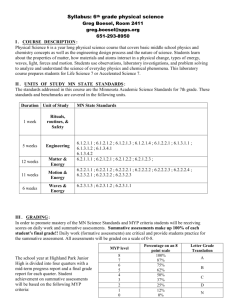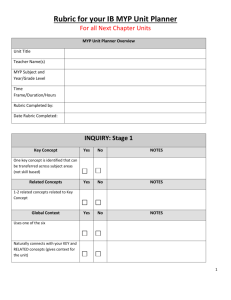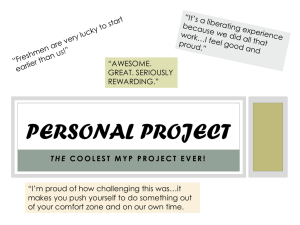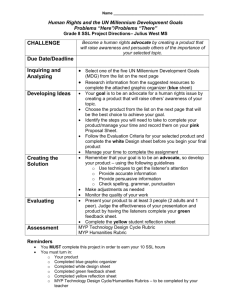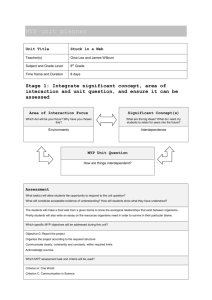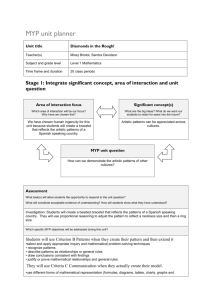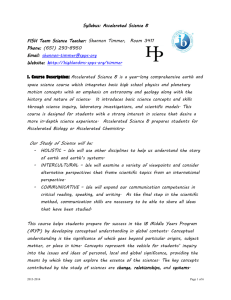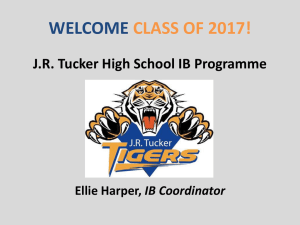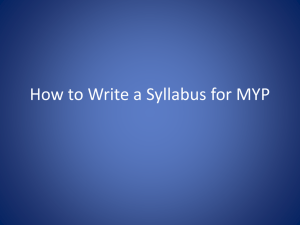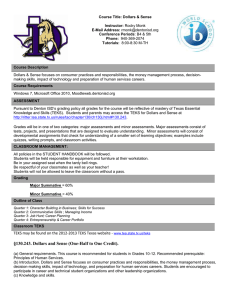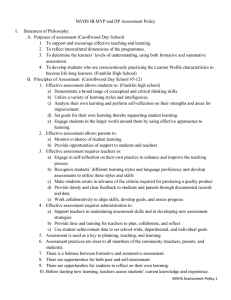Science 6 Course Outline
advertisement
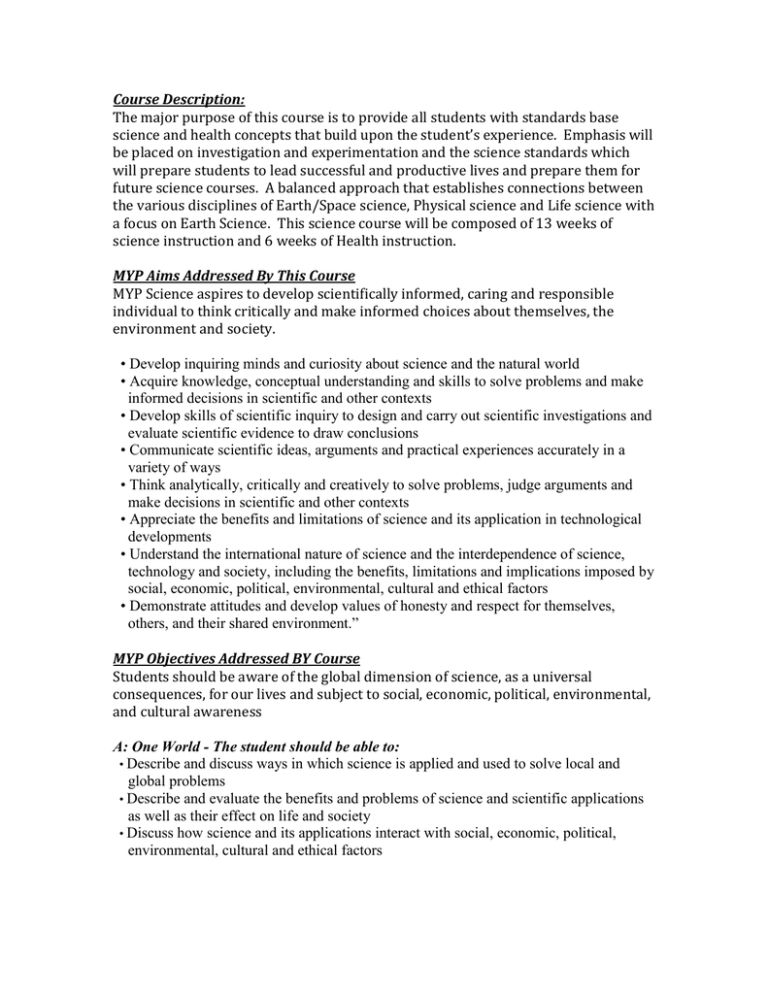
Course Description: The major purpose of this course is to provide all students with standards base science and health concepts that build upon the student’s experience. Emphasis will be placed on investigation and experimentation and the science standards which will prepare students to lead successful and productive lives and prepare them for future science courses. A balanced approach that establishes connections between the various disciplines of Earth/Space science, Physical science and Life science with a focus on Earth Science. This science course will be composed of 13 weeks of science instruction and 6 weeks of Health instruction. MYP Aims Addressed By This Course MYP Science aspires to develop scientifically informed, caring and responsible individual to think critically and make informed choices about themselves, the environment and society. • Develop inquiring minds and curiosity about science and the natural world • Acquire knowledge, conceptual understanding and skills to solve problems and make informed decisions in scientific and other contexts • Develop skills of scientific inquiry to design and carry out scientific investigations and evaluate scientific evidence to draw conclusions • Communicate scientific ideas, arguments and practical experiences accurately in a variety of ways • Think analytically, critically and creatively to solve problems, judge arguments and make decisions in scientific and other contexts • Appreciate the benefits and limitations of science and its application in technological developments • Understand the international nature of science and the interdependence of science, technology and society, including the benefits, limitations and implications imposed by social, economic, political, environmental, cultural and ethical factors • Demonstrate attitudes and develop values of honesty and respect for themselves, others, and their shared environment.” MYP Objectives Addressed BY Course Students should be aware of the global dimension of science, as a universal consequences, for our lives and subject to social, economic, political, environmental, and cultural awareness A: One World - The student should be able to: • Describe and discuss ways in which science is applied and used to solve local and global problems • Describe and evaluate the benefits and problems of science and scientific applications as well as their effect on life and society • Discuss how science and its applications interact with social, economic, political, environmental, cultural and ethical factors B: Communication - The student should be able to: • Communicate scientific information using a range of scientific language • Present scientific information in a variety of formats, acknowledging sources as appropriate • Demonstrate honesty when handling data and information, acknowledging sources as appropriate C: Scientific Knowledge & Concepts - The student should be able to: • Recognize and recall scientific information • Explain and apply scientific information to solve problems in familiar and unfamiliar situations • Analyze scientific information by identifying components, relationships and patterns D: Scientific Enquiry - The student should be able to: • Define the problem or research question to be tested by a scientific investigation • Formulate a hypothesis and explain it using logical scientific reasoning • Design scientific investigations that include variables and controls, material/equipment needed, a method to be followed, data to be collected and suggestions for its analysis • Evaluate the method, commenting on its reliability • Suggest improvements to the method E: Processing Data - The student should be able to: • Collect and record data using appropriate units of measurement • Organize and transform data into numerical and diagrammatic forms, including mathematical calculations and visual representation (tables, graphs and charts) • Analyze and interpret data by identifying trends, patterns and relationships • Draw conclusions supported by scientific explanations and a reasoned interpretation of the analysis of the data F: Performance in Experiments - The student should be able to: • Carry out scientific investigations using materials and techniques safely and skillfully • Work effectively as members of a team, collaborating, acknowledging and supporting others as well as ensuring a safe working environment; show respect for themselves and others, and deal responsibly with the living and non-living environment Areas of Interaction: Topics: Unit Title IB MYP Area of Interaction Unit Question Scientific Thinking and Inquiry Approaches to Learning How can science help us understand our world? I, the Scientist Human Ingenuity How can I push the limits of scientific knowledge? Heat and Weather Environments How do natural forces shape our environment? Plate Tectonics Community and Service How do we respond to catastrophic events? The Rock Cycle Environments How is our Earth constantly changing? Ecology Environments How does our environment influence the way we live? Health Community How do our actions influence the way we grow and develop? Texts and Resources Holt California Earth Science Textbook Grade 6 Holt California Earth Science Study Guide A Students will need the following supplies in class every day: 1 Composition Notebook - This will be their Science Notebook to keep records of lab investigations. Notebook (binder section, spiral or folder)-This will be used to take daily notes and keep handouts. Black/Blue Ink Pens or Pencils Colored Pencils Student Planner – to record daily assignments and aid in home/school communication Methodology The sixth grade science will provide a base for the study of science throughout the rest of the student’s academic career. The basic skills with the use of inquiry in the classroom will be addressed as well as units in life science, earth science, and physical science. The in depth study of energy forms and transfers, simple machines, complex machines, water and the atmosphere, weather, animal adaptations and classification, and forms and transfer of energy will all be covered. With the study of these topics the scientific method, SI system of measurement, technological design cycle, and laboratory skills will also be focused on in class. Methods of Assessment Key Instructional Learning Strategies - Co-operative learning groups – students work together, employing different learning styles to accomplish IB MYP objectives through diverse learning activities and assessments including: Inquiry-based, experimental labs Interdisciplinary units incorporating learning objectives across subject areas Student projects and presentations Collaborative reading and writing activities utilizing a variety of textual sources Individual or optional partner science project – students conduct and present long term, research-based projects utilizing the scientific method. LAUSD Science Quarterly Assessments Assessments Co-operative learning groups and individual/partner science projects will be evaluated using the IB MYP assessment criteria including: Formative Assessments – a combination of lab reports, quizzes, tests, presentations and written assignments will be used. Summative Assessments – students will receive an IB MYP criterion based rubric for long term projects before project commencement. GRADING POLICY AND GRADING PROCEDURES/WEIGHTING AND HOMEWORK POLICY Middle school students will receive a numeric grade for each subject based on a grading scale. The numeric grade and category of the course determine the quality points earned for Science class as follows. A 93-100 B 85-92 C 77-84 D 70-76 F 69 or Below (No Credit)
